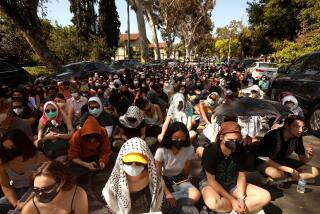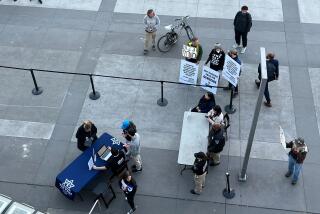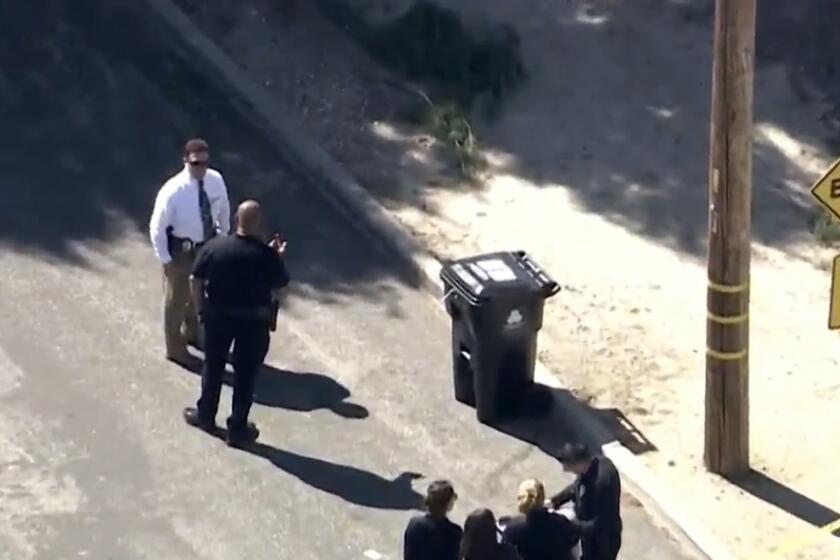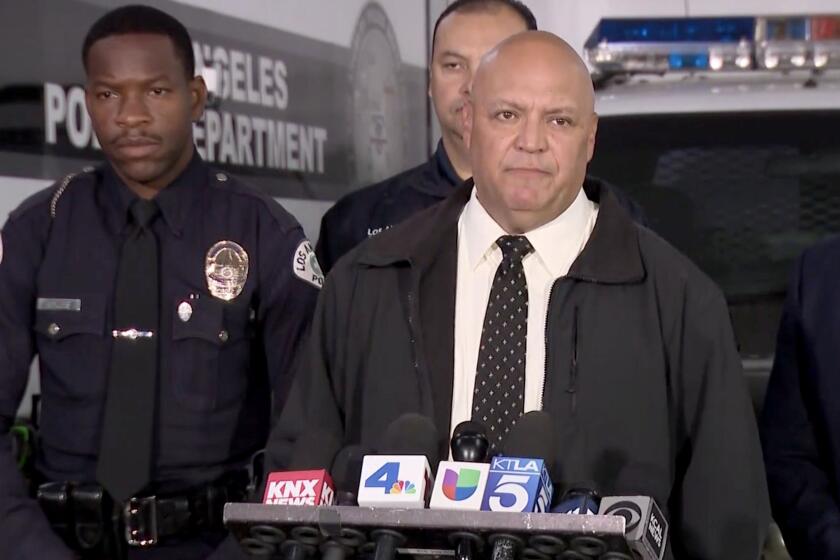Student sit-in continues at UC Berkeley over tuition hikes
A student sit-in protesting tuition hikes at the University of California continued at UC Berkeley’s Wheeler Hall for the third day Saturday, while others planned to make a peaceful presence felt at the football game between Cal and Stanford.
Students planned to wear green ribbons at the annual Big Game at California Memorial Stadium, a symbol of the financial burden of the fee hikes. On Thursday, UC regents voted 14-7 to permit fees hikes of as much as 28% over the next five years, depending on state funding; Gov. Jerry Brown and Assembly Speaker Toni Atkins (D-San Diego), both regents, voted against the measure.
“The aim is not to disrupt the game or the proceedings around it, but to spread awareness of the regents’ vote and its effect on students,” the group occupying Wheeler Hall, known as the Open UC,” said on its blog. Students have been posting updates on Twitter using hashtags #OccupyWheeler and #fightthehike.
Students began trickling into Wheeler Hall in the heart of the Bay Area campus at about 7 p.m. Wednesday. They stayed overnight after it closed. Demonstrators expected the sit-in to continue at least until the day before Thanksgiving.
The students want UC to drop the tuition hikes, bring full transparency to the budget process and drop criminal charges against UC Berkeley student Jeff Noven, 21, who was arrested at the regents’ meeting at UC San Francisco on suspicion of felony vandalism and inciting a riot.
On Friday, students gathered to talk about their next move, while others worked on homework and slept. The mood lightened after 9:30 Friday night, when some students watched a movie, and later, after a DJ arrived, started dancing. Students are planning a walk-out on Monday at noon and a rally.
UC police have informed protesters that they’re breaking university policy by occupying the building. “But they have not really made any real action to move us out,” said Kathleen Sheffer, 21, a UC Berkeley architecture senior and a spokeswoman for the protesters.
Security personnel have “remained in the building to monitor the situation and I’ve heard that they would intervene if anything got violent,” she said. “But so far, it’s been fairly amicable relationship with us and them.”
The group is making decisions during what they call a general assembly, where votes are taken on any future action by the protesters. The students have renamed the building “Wheeler Commons,” making it clear the the building is open to all.
Other student committees have formed, and some instructors have visited to speak with them. One came to “talk to us about protests during the Vietnam War,” Sheffer said.
“Last night it was more chill,” she said. “We’re enjoying being there.”
There’s been some discussion of moving to different buildings on Monday as the student walkout begins. Other UC campuses may join in, she said.
“I think the key for the weekend is to stay strong and keep the momentum,” Sheffer said.
Despite the regents’ vote, students still don’t know how much next year’s tuition will be. The plan that was approved Thursday allows UC President Janet Napolitano to lower or eliminate tuition hikes annually based on state funding.
Universitywide tuition for in-state students is now $12,192 a year, roughly double what it was in 2005. This does not include campus-based fees, room or board.
Events in January will be important in deciding whether tuition will go up to as much as $12,804 next year and to a high of $15,564 in five years.
At the regents meeting next month, the governor intends to seek a special committee to examine UC’s spending and long-term reforms that he advocates, such as offering more online courses, moving more students toward graduation in three years and giving some academic credit for work and military experience.
Asked Thursday about the governor’s UC funding plans, his office said only that “next steps will be outlined” in his January proposal for the 2015-16 state budget. A May revision and legislative action will follow.
A critic of high executive salaries at UC, the governor initially said the school would receive 4% more state revenues in the next two years — only if the tuition freeze that began in 2012 continues. According to Napolitano, UC needs that 4% plus increases of up to 5% more each year for five years, or its equivalent from the state, to be able to meet higher payroll and retirement costs, hire more faculty and enroll 5,000 more California undergraduates over that period. A third of the tuition money will go toward financial aid.
The UC system received $2.64 billion from the state general fund this year, about $460 million less than it did seven years ago.
Times staff writers Larry Gordon and Veronica Rocha contributed to this report.
Follow me on Twitter for more breaking news: @ronlin
More to Read
Start your day right
Sign up for Essential California for news, features and recommendations from the L.A. Times and beyond in your inbox six days a week.
You may occasionally receive promotional content from the Los Angeles Times.







